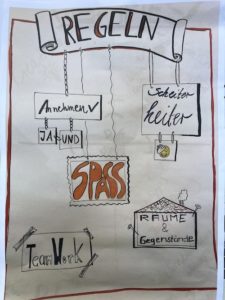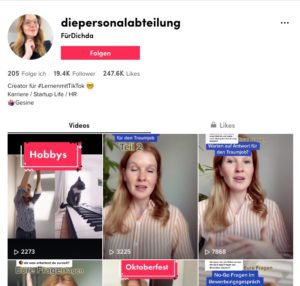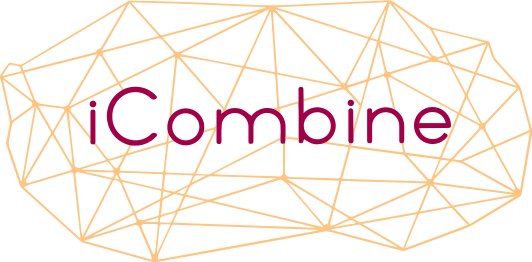In our everyday and professional life, we often find ourselves in unpredictable situations. The conditions of our actions can be influenced by volatility, uncertainty, complexity and ambiguity (keyword: VUCA). Often a quick and competent reaction is required. How can we as individuals react in such moments in a relaxed and professional manner?
We were familiarized with a new approach: Gesine Schulz uses techniques from improvisational theater, which can be of great advantage especially in fast-moving and uncertain times. In August 2020 Gesine has already introduced the participants of the 33rd New Work Berlin Meetup to the world of improvisation. Of course, we do not want to keep the insights to ourselves!

Gesine Schulz, improv talent and founder of itsaboutskills
In this interview, you will learn how Gesine came to her concept of Improv(e) Yourself, what the art of improvisation is all about and how you can transfer this approach to your VUCA world.
Richard: Your concept is called Improv(e) Yourself. How did you come up with the idea for it?
Gesine: I have been playing improvisational theater for five years. It has always been a hobby, but at some point, I realized that the basic techniques also fit perfectly into everyday professional life. In my regular workshops on communication formats or in the context of team building, I have started to use elements from improvisational theater more often. That worked very well – the idea for the concept was born.
Richard: What makes a good improviser? What do I have to consider when improvising?

The most important rules: acceptance, fun, cheerful failure, teamwork, making use of rooms and objects
Gesine: Improvisation is about dealing with the unknown in a better way. On stage or in the theater, the improviser does not know what the audience wants next. This means following your instinct, letting go and building trust in yourself. However, no one is in a vacuum, neither on stage nor at work. We always have to be aware of our companions and superiors. Therefore a good improviser is definitely a team player who does not use elbow tactics. Instead, she accepts the circumstances as they are and keeps the common goal in mind: When improvising on stage, the audience should have fun and laugh. At work, you want to create a successful business and encourage cooperation.
Richard: Which methods do you use in your workshops to stimulate the talent of improvisation?
Gesine: With my methods, I encourage the participants to let go. They step back from the well-tried and learn that it is okay not to have a plan for the time being. Many people are trapped in their existing processes, tools and responsibilities. They get into a rush when they don’t know what will happen next. I teach them to release inner blockades, to adopt a positive mindset and to build trust in others. Stimulating their own creativity plays an important role in this process. Spontaneity and quick-wittedness can actually be trained by means of classical improvisation exercises. In this way, everyone can learn to find alternatives even in difficult situations without getting emotionally upset. The contents of my workshops are very different and are adapted to the objectives, for example, to improve team building, employee onboarding, or pitches.
Richard: What reactions do you observe among the participants during and after the workshops?
Gesine: Usually I do not give any information in advance about what exactly will happen in the workshops. Of course, many people ask what the agenda looks like, which methods I use and what exactly will be going on. So first of all people look for the so-called security anchor. They want to know if they will have fun and what they have to prepare for. I notice again and again that after the first exercises the initial tensions, insecurities and fear of contact disappear. Making mistakes, for example when a rule is overlooked in an improv game, is suddenly completely okay and even amusing. People who were strangers to each other before easily grow together and feel a sense of belonging. Trust is built. Small improv-scenes emerge. The participants find connections to each other more quickly. Deeper conversations take place afterward. Initial skeptics suddenly become fans of improvisation.

Richard: In which work situations do the techniques of improvisation help you?
Gesine: By now I can handle it much better when situations are unclear and I don’t know what is happening. The mindset described above helps me to fend off stress reactions. I am also more tolerant of other opinions. On stage, I have learned to work with the input of my counterpart or the audience when we play a scene together. No matter what assertion or idea is in the room. In working life, for example, it can happen that a change of direction is decided by management or the team. Instead of falling into a categorical defensive attitude, I can approach this with respect and tolerance. Another example would be a presentation in which I am suddenly thrown off guard because an extremely important slide is missing. Instead of panicking, I remain calm and reproduce the content from my memory with confidence.
Richard: How do people react when you improvise?
Gesine: Usually nobody notices it. Sometimes I already have the feeling that I am almost too relaxed. There’s hardly anything that makes me anxious. On the other hand, when I have a good improviser in front of me, I recognize the self-confidence in the individual abilities, spontaneity and quick-wittedness. The person keeps a cool head, shows confidence and demonstrates creativity in dealing with new situations.
Richard: Which steps do you recommend if one of our readers is interested in improvisation and wants to learn more?

On TikTok, Gesine addresses various HR topics in a humorous way.
Gesine: To get started, visiting an improv-show is a good way to get a first impression of this form of theater. In addition, everyone can learn the basic techniques by participating in a workshop and observing their own enthusiasm. There are many opportunities to get a taste of it, in different languages and intensities. Of course, books and YouTube videos also give good insight. Everyone can then decide for him or herself whether this will become a new hobby.
Richard: How can I get in touch with you to learn more?
Gesine: You can find me on Linkedin and check out my Website for more information. On TikTok, I make entertaining videos as @diepersonalabteilung.
Title picture from Freepik.


